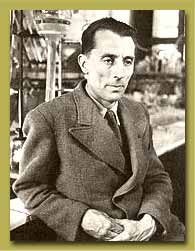
|
| For his hard and dangerous secret work during
the war, Joliot, shown here just after the Occupation, was named
a commander of the Legion of Honor with a military title and
awarded the Croix de Guerre. |
|

 RED
WAS A HERO IN THE WAR. Pretending to be busy with theoretical
atomic physics, he risked his life by using his lab to manufacture
explosives and radio equipment for the Resistance. After the liberation
of France, he was appointed director of the National Center for
Scientific Research. Meanwhile he was elected to the French Academy
of Sciences. Soon thereafter he became head of the French Atomic
Energy Commission. His task was to make France a world leader in
the nuclear industry. Irène became not only a commissioner but also
the director of the Radium Institute. RED
WAS A HERO IN THE WAR. Pretending to be busy with theoretical
atomic physics, he risked his life by using his lab to manufacture
explosives and radio equipment for the Resistance. After the liberation
of France, he was appointed director of the National Center for
Scientific Research. Meanwhile he was elected to the French Academy
of Sciences. Soon thereafter he became head of the French Atomic
Energy Commission. His task was to make France a world leader in
the nuclear industry. Irène became not only a commissioner but also
the director of the Radium Institute.
But the Joliot-Curies'
political activities led to their political downfall. In spring
1942 Fred had secretly joined the French Communist party, at that
time a leading anti-Nazi force. Although Irène never became a member,
she sympathized with many movements in which French Communists took
a lead, including support of equal rights for French women.
|
At the height of the Cold War, Fred was dismissed from his position at the French Atomic
Energy Commission. A few months later Irène also lost her post as commissioner.
“Progressive scientists and communist scientists shall
not give a jot of their science to make war against the
Soviet Union...we shall hold firm, sustained by our conviction
that in so doing we serve France and all of humanity.”
--Joliot's address at the French Communist Party's
12th National Congress, April 1950
|
|
|
|
| Joliot, shown here speaking in public in 1950,
realized that his outspoken pro-Communist views would be his
undoing. In April 1950, he told his friends, “If the government
doesn't fire me after what I've said, I don't know what more
they need.” |
|
|
|
| Photographed at an international scientific
meeting in Stockholm in July 1953, Irène was denied a hotel
room by city innkeepers who disapproved of her political views.
|
|
|
The Curie family's
domination of French nuclear physics had come to an end. The Joliot-Curies
never abandoned their efforts to promote world peace. Irène continued
to work in her lab until a few months before her death. But largely
as a result of her efforts, a new scientific facility at Orsay,
south of Paris, soon replaced the Radium Institute as France's nuclear
research center. Fred kept his chair at the prestigious Collège
de France, which he had held since 1937, and accepted Irène's chair
at the Sorbonne after her death. He survived his wife by only two
years. He succumbed to a liver disease, perhaps induced by radiation.
Both Joliot-Curies were given state funerals.
|
|

